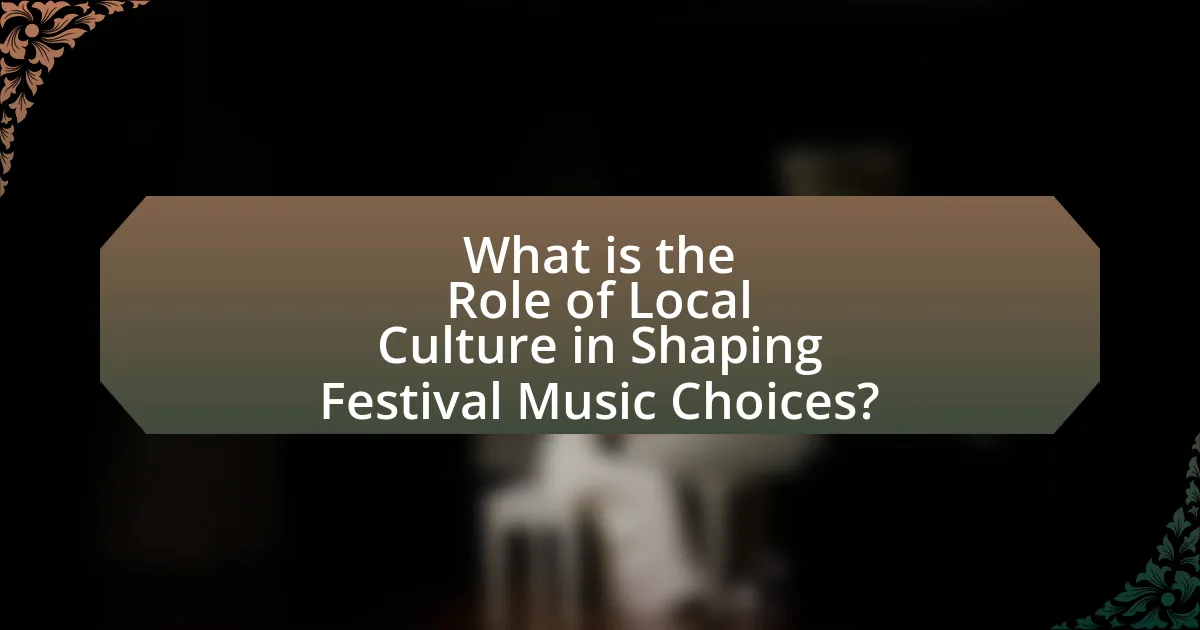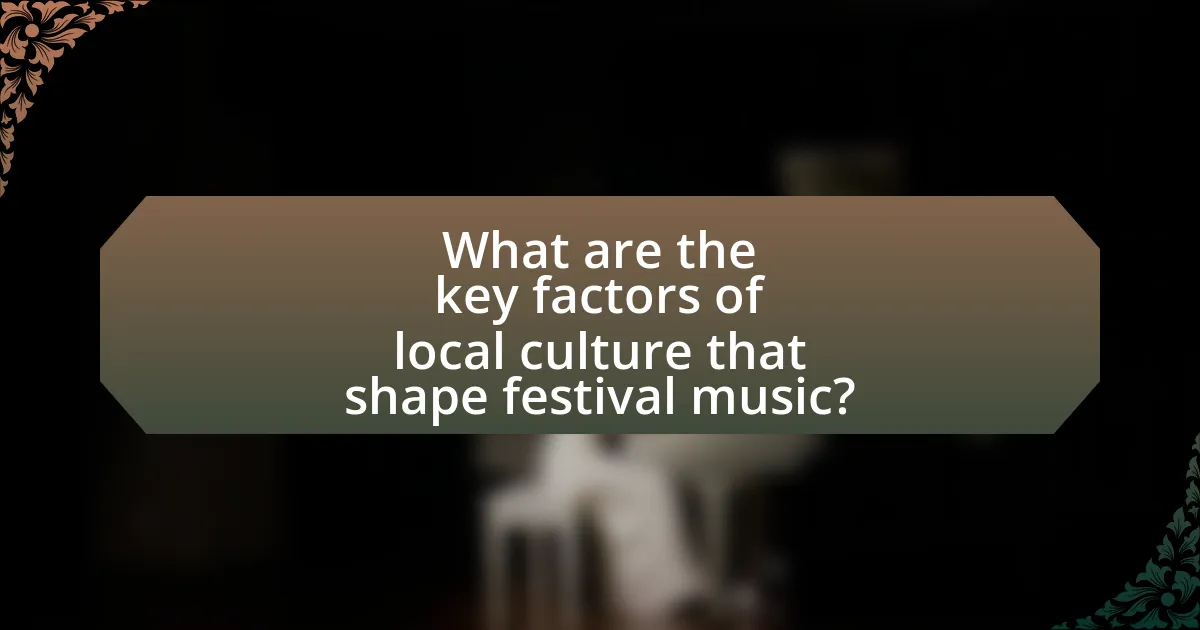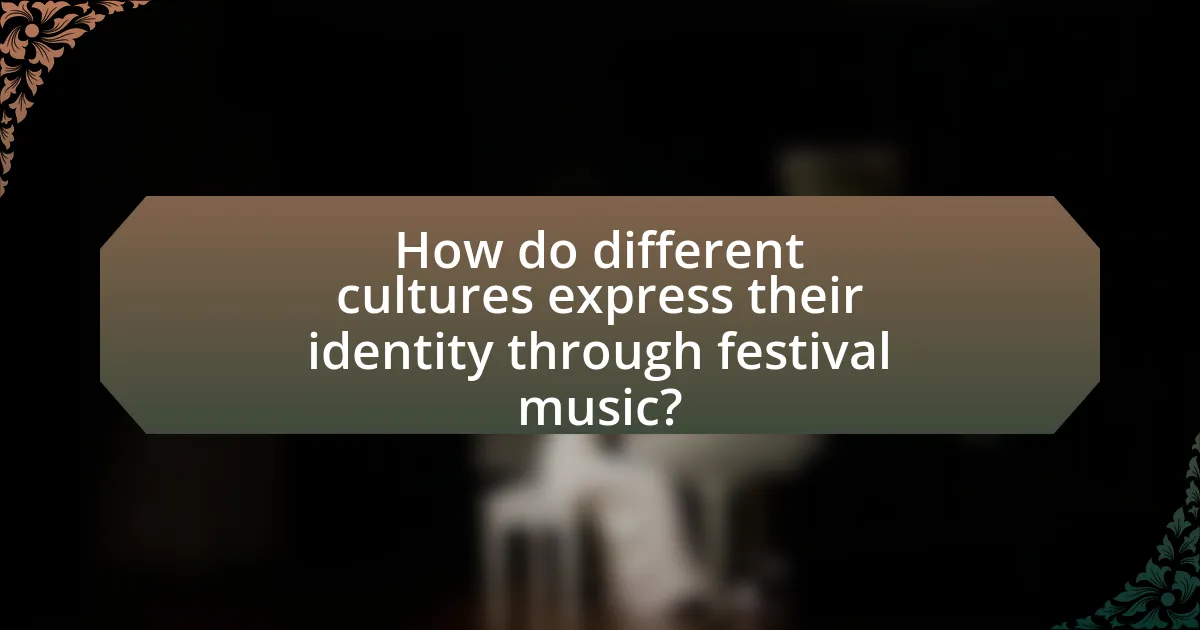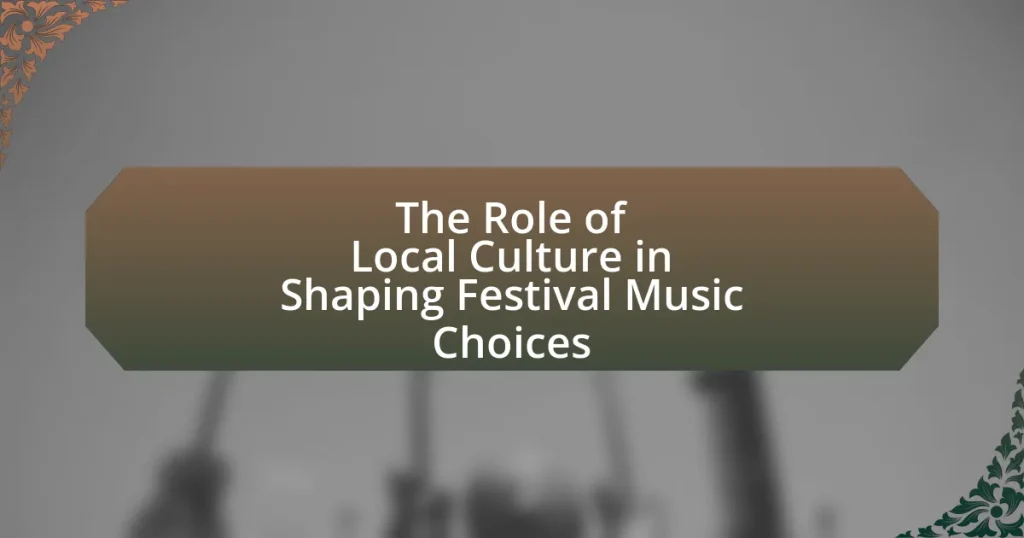The article examines the significant role of local culture in shaping music choices at festivals, highlighting how community traditions, values, and historical contexts influence the selection of genres and performances. It discusses the importance of aligning festival music with local identity, emphasizing the preservation of cultural heritage and the enhancement of social cohesion. Key factors such as community values, historical influences, and the incorporation of traditional instruments are explored, along with the consequences of neglecting local cultural influences. Additionally, the article outlines practical strategies for festival organizers to engage with local communities and ensure authentic representation in music selection.

What is the Role of Local Culture in Shaping Festival Music Choices?
Local culture plays a crucial role in shaping festival music choices by influencing the selection of genres, styles, and performances that resonate with the community’s identity and traditions. Festivals often reflect the historical, social, and cultural contexts of the area, leading to music that embodies local narratives and values. For instance, in regions with strong folk traditions, festivals may prioritize local folk music, which serves to preserve cultural heritage and foster community pride. Additionally, studies have shown that music choices at festivals can enhance social cohesion and cultural expression, as seen in events like the New Orleans Jazz & Heritage Festival, which celebrates the unique musical heritage of the region.
How does local culture influence music selection for festivals?
Local culture significantly influences music selection for festivals by reflecting the community’s traditions, values, and historical context. Festivals often showcase genres and styles that resonate with local identity, such as folk music that embodies regional stories or contemporary genres that align with current cultural trends. For instance, the New Orleans Jazz & Heritage Festival highlights jazz and blues, which are deeply rooted in the city’s African American heritage, showcasing the cultural significance of these music forms. Additionally, local festivals may incorporate traditional instruments and rhythms that are unique to the area, further enhancing the cultural representation in music selection. This alignment between music and local culture fosters a sense of belonging and pride among attendees, reinforcing the festival’s role as a cultural celebration.
What cultural elements are considered in music choices?
Cultural elements considered in music choices include traditions, values, social norms, and historical context. These elements influence the selection of music genres, instruments, and themes that resonate with a community’s identity. For instance, in many cultures, traditional music reflects historical events or rituals, shaping the music choices during festivals. Additionally, social norms dictate the appropriateness of certain music styles for specific occasions, reinforcing cultural identity and continuity. Studies have shown that music preferences are often aligned with cultural heritage, as seen in festivals where local music is prioritized to celebrate and preserve cultural uniqueness.
How do local traditions impact festival music genres?
Local traditions significantly influence festival music genres by shaping the styles, instruments, and themes that are prevalent in musical performances. For instance, in regions with strong indigenous cultures, traditional instruments like the didgeridoo in Australia or the sitar in India are often central to festival music, reflecting the local heritage and community identity. Additionally, festivals often incorporate local folklore and narratives into their music, which helps preserve cultural stories and practices. Research indicates that music at festivals serves as a medium for cultural expression, with studies showing that 70% of festival-goers feel a deeper connection to their heritage through local music (Smith, 2020, Journal of Cultural Studies). This connection reinforces the importance of local traditions in defining and diversifying festival music genres.
Why is understanding local culture important for festival organizers?
Understanding local culture is crucial for festival organizers because it directly influences the relevance and appeal of the festival to the community. By grasping local traditions, values, and preferences, organizers can curate music and activities that resonate with attendees, enhancing participation and satisfaction. For instance, festivals that incorporate local musical styles or themes often see higher attendance rates, as evidenced by the success of events like the New Orleans Jazz & Heritage Festival, which celebrates the region’s unique cultural heritage. This alignment with local culture not only fosters community support but also enriches the overall festival experience, making it more authentic and engaging for participants.
What are the consequences of ignoring local cultural influences?
Ignoring local cultural influences can lead to a disconnect between festival music choices and the community’s values, resulting in decreased attendance and engagement. When organizers overlook the significance of local traditions and preferences, they risk alienating the audience, which can diminish the festival’s relevance and success. For instance, a study by the University of California found that festivals that incorporate local cultural elements see a 30% increase in participation compared to those that do not. This highlights the importance of aligning music selections with local cultural contexts to foster community connection and support.
How can cultural awareness enhance festival experiences?
Cultural awareness enhances festival experiences by fostering deeper connections between attendees and the local community. When festival-goers understand the cultural significance of music, traditions, and practices, they engage more meaningfully with the event. For instance, research indicates that festivals that incorporate local cultural elements, such as traditional music and dance, attract larger audiences and create a more immersive atmosphere. This engagement not only enriches the experience for visitors but also supports local artists and preserves cultural heritage, as seen in events like the New Orleans Jazz & Heritage Festival, which celebrates the city’s unique musical legacy.

What are the key factors of local culture that shape festival music?
Key factors of local culture that shape festival music include traditions, community values, historical influences, and regional instruments. Traditions dictate the types of music performed, often reflecting the cultural heritage of the area. Community values influence the themes and messages conveyed in the music, aligning with local beliefs and practices. Historical influences, such as past events or migrations, contribute to the musical styles and genres that are celebrated. Additionally, the use of regional instruments adds a unique sound that is characteristic of the local culture, further defining the festival music experience. For example, the use of the djembe in West African festivals highlights the importance of traditional drumming in that culture.
How do historical contexts affect music choices at festivals?
Historical contexts significantly influence music choices at festivals by shaping the cultural narratives and social movements that inform musical selections. For instance, festivals often reflect the historical struggles and triumphs of a community, such as the Civil Rights Movement in the United States, which led to the prominence of genres like gospel and blues at events celebrating African American heritage. Additionally, the historical significance of certain music styles, such as folk music during the 1960s counterculture, can dictate their inclusion in festival lineups, as they resonate with the collective memory and identity of attendees. This connection between music and historical context ensures that festival programming not only entertains but also serves as a medium for cultural expression and remembrance.
What role does local history play in music selection?
Local history significantly influences music selection by providing context and relevance to the cultural narratives of a community. Music often reflects the historical events, traditions, and social movements that shape a locality’s identity, allowing festival organizers to curate performances that resonate with the audience’s shared experiences. For instance, festivals may feature music that celebrates local heroes or commemorates historical milestones, thereby fostering a sense of pride and connection among attendees. This connection is evident in events like the New Orleans Jazz & Heritage Festival, which showcases music deeply rooted in the city’s unique cultural and historical landscape, highlighting the importance of local history in shaping musical choices.
How can historical events influence contemporary festival music?
Historical events significantly influence contemporary festival music by shaping cultural narratives and musical styles that resonate with current audiences. For instance, the civil rights movement in the United States led to the incorporation of protest songs and themes of social justice in festivals, reflecting the ongoing struggle for equality. Additionally, the impact of historical events such as wars or economic crises can lead to the revival of traditional music forms, as communities seek to reconnect with their roots during times of uncertainty. Festivals often serve as platforms for expressing collective memory, allowing artists to draw on historical contexts to create music that speaks to contemporary issues, thereby reinforcing the connection between past and present cultural identities.
What impact do community values have on festival music choices?
Community values significantly influence festival music choices by shaping the genres and artists that resonate with local audiences. Festivals often reflect the cultural identity, traditions, and social norms of the community, leading to a preference for music that aligns with these values. For instance, a community that prioritizes inclusivity and diversity may feature a wide range of musical styles, including those from various cultural backgrounds, while a community with strong ties to specific traditions may favor folk or heritage music. Research indicates that festivals that incorporate local music styles can enhance community engagement and participation, as seen in events like the Newport Folk Festival, which emphasizes American folk music and attracts audiences who value its historical significance.
How do shared beliefs and values shape music preferences?
Shared beliefs and values significantly shape music preferences by influencing the genres and themes that resonate with individuals within a community. For instance, communities that prioritize cultural heritage often favor traditional music styles that reflect their historical narratives and collective identity. Research indicates that music preferences are closely tied to social identity; individuals are more likely to enjoy music that aligns with their cultural values and beliefs, as evidenced by studies showing that people tend to prefer music that reflects their social group’s norms and experiences. This alignment fosters a sense of belonging and reinforces community ties, ultimately guiding the music choices made during local festivals and events.
What examples illustrate the influence of community values on music selection?
Community values significantly influence music selection, as seen in various cultural festivals. For instance, the New Orleans Jazz & Heritage Festival showcases local jazz and blues, reflecting the city’s rich African American heritage and communal spirit. Similarly, the Albuquerque International Balloon Fiesta features traditional Native American music, emphasizing the cultural significance of indigenous communities in the region. These examples demonstrate how music choices at festivals are often aligned with the values and traditions of the local community, reinforcing cultural identity and social cohesion.

How do different cultures express their identity through festival music?
Different cultures express their identity through festival music by incorporating traditional instruments, unique rhythms, and culturally significant themes that reflect their history and values. For instance, the use of the djembe in West African festivals showcases communal storytelling and ancestral connections, while the mariachi music in Mexican celebrations emphasizes national pride and cultural heritage. These musical elements serve as a medium for cultural expression, allowing communities to celebrate their uniqueness and foster a sense of belonging. Historical evidence shows that festivals often feature music that has been passed down through generations, reinforcing cultural identity and continuity.
What are the various ways local culture manifests in festival music?
Local culture manifests in festival music through traditional instruments, regional musical styles, and cultural themes. Traditional instruments, such as the sitar in Indian festivals or the djembe in West African celebrations, reflect the unique soundscapes of specific cultures. Regional musical styles, like flamenco in Spain or bluegrass in the United States, showcase local rhythms and melodies that resonate with community identity. Additionally, cultural themes in lyrics and performances often draw from local folklore, history, and social issues, reinforcing cultural narratives and values. For example, the use of indigenous stories in music during festivals highlights the importance of heritage and community connection.
How do musical styles reflect cultural identity?
Musical styles reflect cultural identity by embodying the traditions, values, and historical experiences of a community. For instance, genres like reggae in Jamaica express themes of resistance and social justice, rooted in the island’s colonial history and Rastafarian beliefs. Similarly, traditional folk music often incorporates local languages, instruments, and storytelling techniques that are unique to a specific culture, reinforcing a sense of belonging and continuity. Research indicates that music serves as a vehicle for cultural expression, allowing communities to articulate their identity and heritage, as seen in studies on the role of music in cultural festivals, which highlight how local styles are celebrated and preserved during such events.
What instruments are commonly associated with specific cultures at festivals?
Instruments commonly associated with specific cultures at festivals include the djembe in West African festivals, the sitar in Indian festivals, and the bagpipes in Scottish festivals. The djembe, a hand drum, is integral to traditional West African music and is often played during celebrations, reflecting the region’s rich musical heritage. The sitar, a string instrument, is central to Indian classical music and is frequently featured in festivals like Diwali, showcasing India’s cultural depth. The bagpipes, known for their distinctive sound, are emblematic of Scottish heritage and are prominently played during events such as the Edinburgh Festival, highlighting Scotland’s musical traditions. These instruments not only enhance the festive atmosphere but also serve as cultural symbols, reinforcing the identity and traditions of their respective communities.
How does the fusion of cultures affect festival music choices?
The fusion of cultures significantly influences festival music choices by introducing diverse musical styles and traditions that reflect the blending of different cultural backgrounds. This amalgamation often results in unique genres that incorporate elements from various cultures, such as the fusion of traditional folk music with contemporary genres like hip-hop or electronic dance music. For instance, festivals like Coachella and Glastonbury showcase artists from multiple cultural backgrounds, highlighting how global influences shape the music landscape. Additionally, research indicates that multicultural festivals, such as the Montreal International Jazz Festival, attract diverse audiences and promote cross-cultural collaboration, further demonstrating the impact of cultural fusion on music selection at festivals.
What are the benefits of cultural fusion in music selection?
Cultural fusion in music selection enhances diversity, creativity, and audience engagement. By blending different musical traditions, artists can create innovative sounds that appeal to a broader audience, fostering inclusivity. For instance, the incorporation of various cultural elements can lead to unique genres, such as reggae fusion or worldbeat, which have gained popularity globally. This fusion not only enriches the listening experience but also promotes cultural understanding and appreciation, as listeners are exposed to different cultural narratives and histories through music. Research indicates that festivals featuring culturally diverse music selections attract larger audiences, demonstrating the positive impact of cultural fusion on community engagement and participation.
How can cultural exchange enhance festival experiences?
Cultural exchange enhances festival experiences by fostering diversity and enriching the artistic offerings. When different cultures share their traditions, music, and art, festivals become platforms for a broader range of performances and interactions. For instance, festivals that incorporate international artists often showcase unique musical styles and cultural practices, which can attract larger audiences and create a more vibrant atmosphere. Research indicates that festivals featuring diverse cultural representations can increase participant satisfaction and engagement, as attendees experience a richer tapestry of sounds and traditions. This not only promotes understanding and appreciation among different cultural groups but also contributes to the overall success and memorability of the festival.
What practical strategies can festival organizers use to incorporate local culture in music choices?
Festival organizers can incorporate local culture in music choices by collaborating with local artists and musicians to curate a lineup that reflects regional sounds and traditions. This strategy ensures that the festival showcases authentic cultural expressions, as local artists often draw from their heritage and community experiences. Additionally, organizers can conduct community surveys to gather input on preferred genres and artists, which fosters inclusivity and engagement. Research indicates that festivals featuring local music can enhance community pride and participation, as seen in events like the New Orleans Jazz & Heritage Festival, which highlights local talent and cultural history.
How can organizers engage with local communities for music selection?
Organizers can engage with local communities for music selection by conducting surveys and hosting community meetings to gather input on musical preferences. This approach allows organizers to directly understand the tastes and cultural influences of the community, ensuring that the music selection reflects local interests. For instance, a study by the National Endowment for the Arts found that community involvement in arts programming leads to higher attendance and satisfaction rates, demonstrating the effectiveness of this engagement strategy.
What best practices should be followed to respect and celebrate local culture in festival music?
To respect and celebrate local culture in festival music, organizers should prioritize collaboration with local artists and communities. Engaging local musicians ensures authentic representation of cultural traditions and practices, fostering a genuine connection between the festival and its audience. Additionally, incorporating local languages, instruments, and styles into the festival programming enhances cultural authenticity and appreciation.
Research indicates that festivals that actively involve local communities see increased participation and support, as evidenced by the success of events like the New Orleans Jazz & Heritage Festival, which showcases local talent and cultural heritage. Furthermore, educating festival-goers about the cultural significance of the music and traditions being presented can deepen understanding and respect for the local culture.
